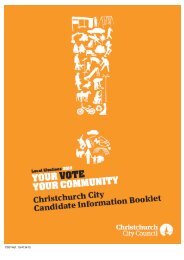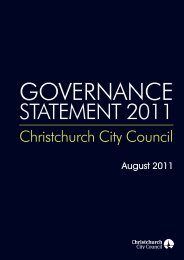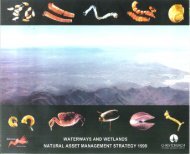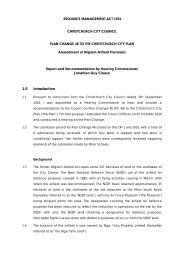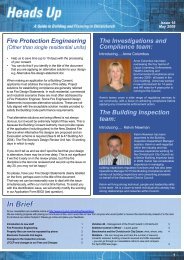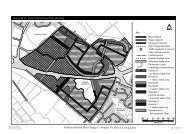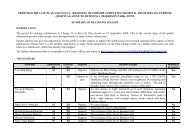Annual Report 2010 - Christchurch City Council
Annual Report 2010 - Christchurch City Council
Annual Report 2010 - Christchurch City Council
Create successful ePaper yourself
Turn your PDF publications into a flip-book with our unique Google optimized e-Paper software.
Statement of<br />
accounting policies<br />
(continued)<br />
Financial statements<br />
<strong>Annual</strong> <strong>Report</strong><br />
<strong>Christchurch</strong> Otautahi<br />
<strong>2010</strong><br />
p153.<br />
Notes to financial statements<br />
1. Statement of accounting policies (continued)<br />
Income tax<br />
Income tax on the profit or loss for the year comprises current and<br />
deferred tax. Income tax is recognised through profit and loss<br />
except to the extent that it relates to items recognised directly in<br />
equity, in which case it is recognised in equity.<br />
Current tax is the expected tax payable on the taxable income for<br />
the year, using tax rates enacted or substantively enacted at the<br />
balance sheet date, and any adjustment to tax payable in respect of<br />
previous years.<br />
Deferred tax is provided using the balance sheet liability method,<br />
providing for temporary differences between the carrying amounts<br />
of assets and liabilities for financial reporting purposes and the<br />
amounts used for taxation purposes. The following temporary<br />
differences are not provided for: goodwill not deductible for tax<br />
purposes and the initial recognition of assets or liabilities that<br />
affect neither accounting nor taxable profit.<br />
The amount of deferred tax provided is based on the expected<br />
manner of realisation or settlement of the carrying amount of assets<br />
and liabilities, using tax rates enacted or substantively enacted at<br />
the balance sheet date.<br />
A deferred tax asset is recognised only to the extent that it is<br />
probable that future taxable profits will be available against which<br />
the asset can be utilised. Deferred tax assets are reduced to the<br />
extent that it is no longer probable that the related tax benefit will<br />
be realised.<br />
Research and development costs<br />
Research expenditure is recognised as an expense as incurred.<br />
Costs incurred on development projects (relating to the design and<br />
testing of new or improved products) are recognised as intangible<br />
assets when it is probable that the project will be a success<br />
considering its commercial and technological feasibility, and<br />
costs can be measured reliably. Other development expenditures<br />
are recognised as an expense as incurred. Development costs<br />
previously recognised as an expense are not recognised as an asset<br />
in a subsequent period. Development costs with a finite useful life<br />
that have been capitalised are amortised from the commencement<br />
of the commercial production of the product on a straight-line basis<br />
over the period of its expected benefit, not exceeding ten years.<br />
Goods and Services Tax<br />
The financial statements are prepared exclusive of GST with the<br />
exception of receivables and payables that are shown inclusive of<br />
GST. Where GST is not recoverable as an input tax it is recognised as<br />
part of the related asset or expense.<br />
Donated goods and services<br />
The <strong>Council</strong> receives the benefit of many services provided by<br />
volunteers. These services are greatly valued. They are, however,<br />
difficult to measure in monetary terms, and for this reason are<br />
not included in the financial statements, as their value from an<br />
accounting point of view is considered immaterial in relation to<br />
total expenditure.<br />
Cost allocations<br />
The costs of all internal service activities are allocated or charged<br />
directly to external service type activities. External service<br />
activities refer to activities which provide a service direct to the<br />
public. Internal service activities provide support for the external<br />
service activities.<br />
Where the recipient of an internal service can be identified, the<br />
cost recovery is made by way of a direct charge. Where this is not<br />
practical or the linkage is indirect, the costs are allocated by way of<br />
corporate overhead.<br />
Two primary drivers for allocating corporate overhead are used.<br />
Services related to people are reallocated based on employee costs,<br />
and those related to finance are reallocated based on external<br />
service activity gross cost.<br />
Plan values disclosed<br />
The plan values shown in the financial statements represent the<br />
2009/10 budget included in the Long Term <strong>Council</strong> Community<br />
Plan 2009-19.<br />
Third party transfer payment agencies<br />
The <strong>Council</strong> collects monies for many organisations. Where<br />
collections are processed through the <strong>Council</strong>’s books, any monies<br />
held are shown as Accounts Payable in the Balance Sheet. Amounts<br />
collected on behalf of third parties are not recognised as revenue,<br />
but commissions earned from acting as agent are recognised in<br />
revenue.



